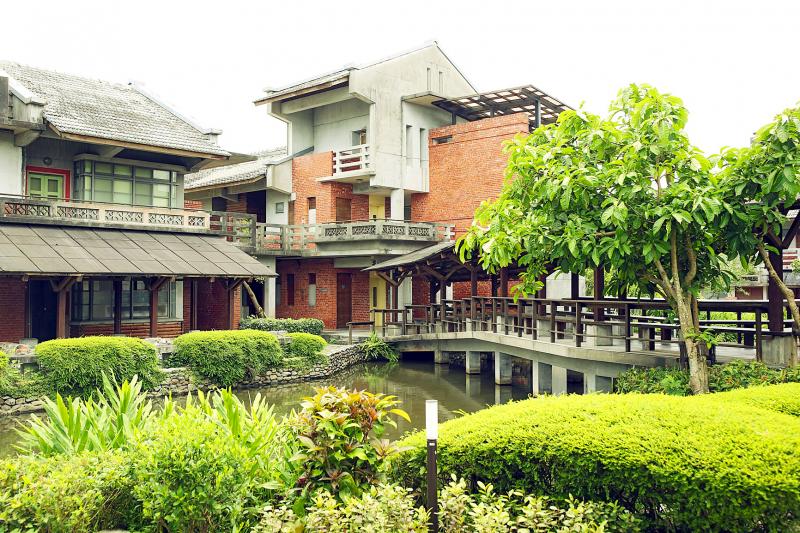Hotel Royal Group (老爺大酒店集團) is to shut down a property in Yilan County’s Wujie Township (五結) under the Place brand when its management contract expires in August, succumbing to a business freeze amid a level 3 COVID-19 alert.
The Place Yilan (宜蘭傳藝老爺行旅), which is within the National Center for Traditional Arts (宜蘭傳藝中心), is the second hotel to exit the market this year after Fullon Hotel Taipei (福容大飯店台北一館).
The Place Yilan started operations in April 2017 under a management contract with Pxmart Co Ltd (全聯實業).

Photo courtesy of The Place Yilan
The hotel’s four conference rooms, a cafe and a restaurant are to close on Aug. 22 after a ban on dine-in services and restrictions on gatherings put them in abeyance.
“We have decided not to renew the contract that is due to expire on Aug. 31 out of concern that hotel operations might not return to normalcy any time soon,” Hotel Royal Group said in a statement on Monday.
People with reservations after Aug. 31 can seek full refunds and those with hotel and restaurant vouchers can redeem at other locations, the group said.
It would help employees to find work at other properties or provide compensations in accordance with labor requirements, it said.
The hospitality industry has relied entirely on domestic tourism for the past one-and-a-half years due to lingering border controls, but domestic tourism also came to a sudden halt after authorities raised the COVID-19 alert to level 3 nationwide on May 19 to curb the spread of local infections.
The group said it would press ahead with operations at 10 other properties under the Place, Hotel Royal (老爺酒店) and Royal Inn (老爺會館) brands, and four properties in Palau, Vietnam, Mauritius and Nicaragua.
Pxmart, which has a 15-year lease from the Yilan County Government to run the cultural and recreational park, said it would look for other parties to fill the space left by The Place Yilan.

HANDOVER POLICY: Approving the probe means that the new US administration of Donald Trump is likely to have the option to impose trade restrictions on China US President Joe Biden’s administration is set to initiate a trade investigation into Chinese semiconductors in the coming days as part of a push to reduce reliance on a technology that US officials believe poses national security risks. The probe could result in tariffs or other measures to restrict imports on older-model semiconductors and the products containing them, including medical devices, vehicles, smartphones and weaponry, people familiar with the matter said. The investigation examining so-called foundational chips could take months to conclude, meaning that any reaction to the findings would be left to the discretion of US president-elect Donald Trump’s incoming team. Biden

INVESTMENT: Jun Seki, chief strategy officer for Hon Hai’s EV arm, and his team are currently in talks in France with Renault, Nissan’s 36 percent shareholder Hon Hai Precision Industry Co (鴻海精密), the iPhone maker known as Foxconn Technology Group (富士康科技集團) internationally, is in talks with Nissan Motor Co’s biggest shareholder Renault SA about its willingness to sell its shares in the Japanese automaker, the Central News Agency (CNA) said, citing people it did not identify. Nissan and fellow Japanese automaker, Honda Motor Co, are exploring a merger that would create a rival to Toyota Motor Corp in Japan and better position the combined company to face competitive challenges around the world, people familiar with the matter said on Wednesday. However, one potential spanner in the works is

SEMICONDUCTORS: Samsung and Texas Instruments would receive US$4.75 billion and US$1.6 billion respectively to build one chip factory in Utah and two in Texas Samsung Electronics Co and Texas Instruments Inc completed final agreements to get billions of US dollars of government support for new semiconductor plants in the US, cementing a major piece of US President Joe Biden administration’s CHIPS and Science Act initiative. Under binding agreements unveiled Friday, Samsung would get as much as US$4.75 billion in funding, while Texas Instruments stands to receive US$1.6 billion — money that would help them build facilities in Texas and Utah. The final deals mean the chipmakers can begin collecting the funding when their projects hit certain benchmarks. Though the terms of Texas Instruments’ final agreement is

Call it an antidote to fast fashion: Japanese jeans hand-dyed with natural indigo and weaved on a clackety vintage loom, then sold at a premium to global denim connoisseurs. Unlike their mass-produced cousins, the tough garments crafted at the small Momotaro Jeans factory in southwest Japan are designed to be worn for decades, and come with a lifetime repair warranty. On site, Yoshiharu Okamoto gently dips cotton strings into a tub of deep blue liquid, which stains his hands and nails as he repeats the process. The cotton is imported from Zimbabwe, but the natural indigo they use is harvested in Japan —